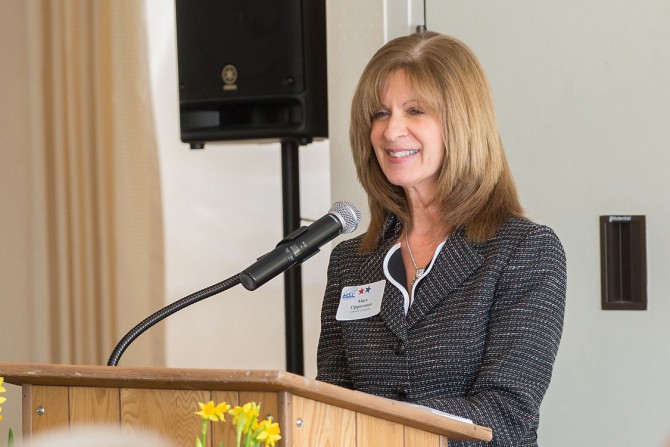Mary Opperman, chief human resources officer, to leave in 2022
By David Nutt
Mary Opperman, vice president and chief human resources officer, has announced her plans to leave Cornell, effective June 30, 2022.
Opperman, whose Cornell career spanned 25 years, oversees the Division of Human Resources, the Office of Inclusion and Workforce Diversity, the Office of Institutional Equity and Title IX, and the Center for Regional Economic Advancement, which she helped establish.
“Mary’s leadership has been transformational for human resources at Cornell,” said President Martha E. Pollack. “Through her care, compassion for, and attention to the needs of our employees, the experience of working at Cornell has also been transformed, for tens of thousands of people. It’s impossible to overstate the role she’s played in making Cornell an equitable, inclusive and positive environment for its employees, or her commitment to promoting economic development in the region. She is a cherished member of the campus community, and we are so grateful for everything she’s done for Cornell and for Cornellians.”
“I have known Mary for my nearly 20-year tenure as a trustee. In addition to being a consistent and effective advocate for our employees, she has become a close confidante to me, given her deep and broad knowledge of the university and its people. She also has managed presidential searches and helped onboard new presidents and trustees – a testament to her extraordinary value to the university, well beyond her official role,” said Robert S. Harrison ’76, chairman of the Board of Trustees. “Her passion has been most evident when it has been needed the most – during challenging times and crises, such as the economic downturn in 2008 and the coronavirus pandemic. She has never once wavered in her efforts on behalf of the university and its people.”
The university will conduct a national search for Opperman’s successor.
Opperman said she had previously considered seeking out a new career opportunity in 2008, when her youngest child graduated from high school, but chose to stay as the university navigated the economic downturn. Then came a series of new projects, such as the university’s sesquicentennial and the launch of Cornell Tech, as well as presidential transitions and the pandemic.
While she runs a division that oversees approximately 18,000 staff and faculty on campuses in Ithaca, Geneva, New York City and Qatar, as well as dozens of research facilities, Opperman is one of those employees herself. She found herself reflecting on her life since the pandemic, she said, and decided the time had come to take the next step.
“Like so many other people, I stepped back during the pandemic and realized I wanted one more adventure,” she said. “I decided that if I was going to do something new, I had to set a date and put a time frame on it. There is always something new and interesting at Cornell. And this is just too busy a job to try to look at new opportunities and do it all in the same time.”
At Cornell, Opperman has overseen a number of pivotal changes in the division, from the rollout of Workday to the establishment of a dedicated office to address equity and Title IX compliance issues.
Perhaps most significant, she said, was the shift in the late 1990s, under President Emeritus Hunter R. Rawlings III, to recognize the direct connection between the faculty and staff who support the university, the experiences of students and the university’s core academic mission – a connection that continues today, with a focus on equity, diversity and inclusion.
“We are interconnected, and faculty and staff are the key to our excellence and to the well-being of our local community. They create the environment in which our students thrive and innovation flourishes,” she said. “Cornell is its people.”
Prior to her arrival at Cornell in 1996, Opperman spent 13 years as director of employee services at Harvard University. She earned her bachelor’s degree from the State University of New York at Oneonta in political science, and she has a master of science degree in organizational behavior from Cornell.
Opperman is a fellow of the National Academy of Human Resources and was named one of the 15 Most Powerful Women in Human Resources by Human Resource Executive Magazine in 2015 and recently as a top chief human resources officer by N2Growth and Stanford Business School. She has also received the Chris C. Kjeldsen Work Life Legacy Award from the Families and Work Institute in 2011 and an Award for Excellence from the Tompkins County Foundation Board in 2008.
Opperman said she is proud of the recognition Cornell has received from organizations such as Working Mothers, Forbes and the Dave Thomas Foundation for Adoption for being a “best” employer and workplace. She is also gratified by Cornell’s contributions to regional economic development and the priority the university has placed on inclusion and belonging.
Among her most treasured moments, however, are the inaugurations, the commencements and the sesquicentennial celebrations at which she volunteered.
“Those are all moments that are really important to me, because they were moments where we were all collectively proud of the university and working together,” she said. “When I think about the last 25 years, I always come back to the people here – the incredible dedication that people show through good times, and challenging times. I am so grateful for all of the opportunities Cornell has afforded me and for the many enduring relationships I have built. I look forward to continuing to contribute throughout this academic year.”
Get Cornell news delivered right to your inbox.
Subscribe

